Taiwan's presidential election a choice between peace and war?
As the Taiwan presidential election heats up in the final month, commentator Gu Erde takes a look at the election narratives surrounding the three parties in the contest, in particular garnering the youth votes, the Taiwan Strait issue and Taiwan's relations with China and the US.
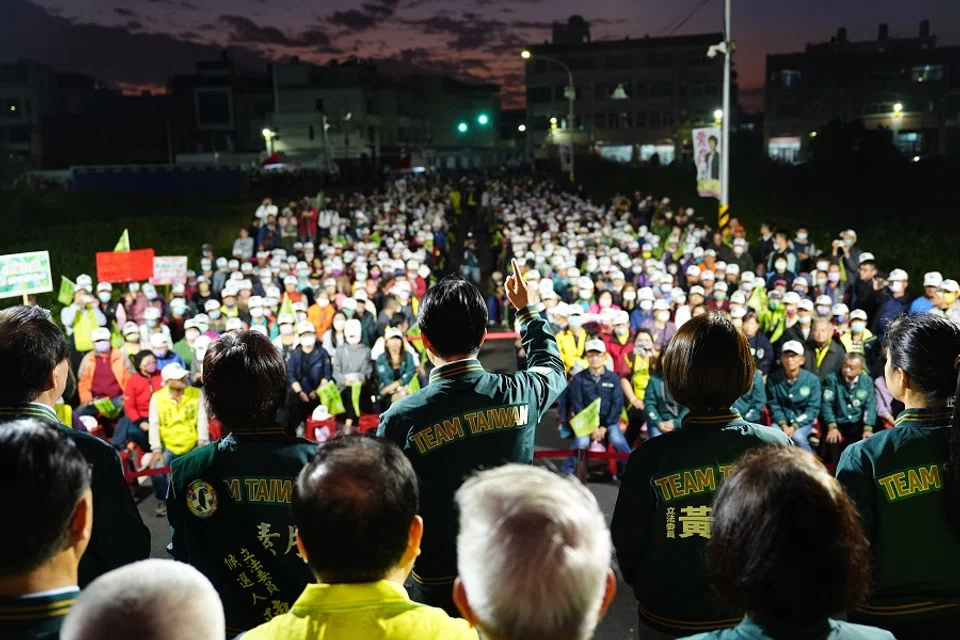
After more than half a month of drama in November, the Blue-White coalition between the Kuomintang (KMT) and Taiwan People's Party (TPP) failed to materialise. Now, the Blue, White and Green (Democratic Progressive Party, DPP) camps have finalised their candidates as the Taiwan election enters its most intense period with just 30 days left. Here are some key issues involving the three camps, as well as the US and China.
Beijing's influence
First, during their San Francisco meeting in mid-November, US President Joe Biden warned Chinese President Xi Jinping not to intervene in the Taiwan election. However, Biden's warning will at most prevent China from intervening openly. A more neutral way to put this is that China will definitely try to "influence" the Taiwan election.
Meanwhile, the TPP's presidential candidate, Ko Wen-je, revealed that the American Institute in Taiwan (AIT) had called him to understand whether China intervened in the proposed Blue-White merger. Clearly, both the US and China hope to benefit from the outcome of the election.
In April this year, after returning from his visit to China, former Taiwan President Ma Ying-jeou said, "Our administration continues to lead Taiwan to danger. The future is a choice between peace and war."
The most obvious influence that Beijing has had on the Taiwan election thus far is the withdrawal of Foxconn founder Terry Gou.
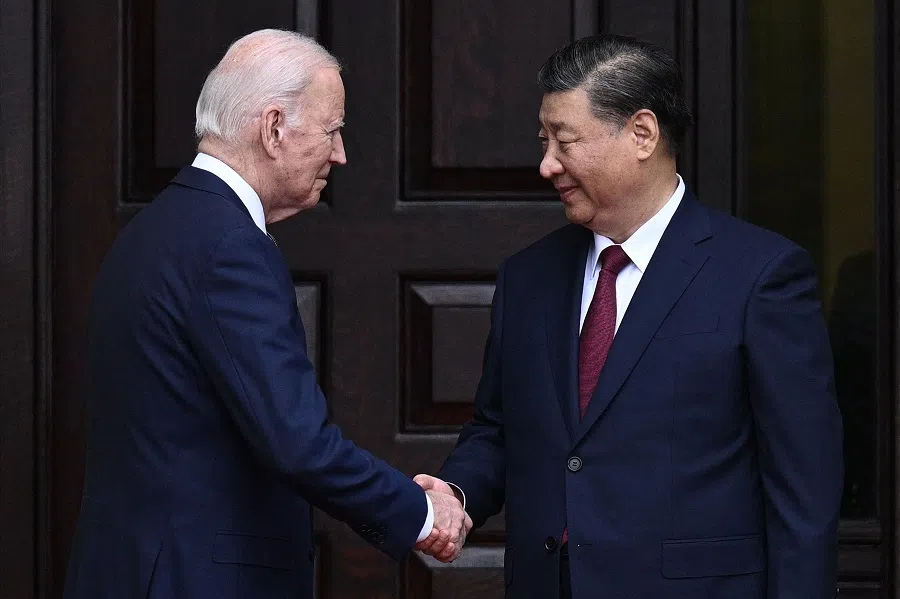
Ma's words set up the forthcoming election as a choice between war and peace. When Ma mooted the idea of a Blue-White coalition, many felt that he was influenced by Beijing to do so. However, going by subsequent developments, it seems more likely that he was only trying to cement his place in history with further contributions following his historic meeting with Xi Jinping and visit to mainland China.
The most obvious influence that Beijing has had on the Taiwan election thus far is the withdrawal of Foxconn founder Terry Gou. Towards the end of October, the Global Times reported that the Chinese government was carrying out tax audits and land use investigations targeting Foxconn Group companies in Guangdong, Jiangsu, Henan and Hubei. After the news broke, Gou's campaigning became muted.
At the end of November, a critical juncture for the proposed Blue-White coalition, the tax authorities in Wuhan slapped Foxconn on the wrist by fining Foxconn 20,000 RMB (US$2,800) for violating the Tax Collection Administration Law. Thereafter, Gou decided to pull out of the race. This coincidence is certainly food for thought.
There are two factors for the plunge in Ko's support: first, reduced support from younger voters; second, pan-Blue supporters switching their allegiance to Hou instead.
Chipping away at Ko's support
During merger talks between the KMT and TPP, support for KMT's Hou You-yi gradually caught up with that for TPP's Ko. There are two factors for the plunge in Ko's support: first, reduced support from younger voters; second, pan-Blue supporters switching their allegiance to Hou instead. Nevertheless, more than 10% of the electorate still supports Ko, and both the Blue and Green camps are actively trying to win these voters over.
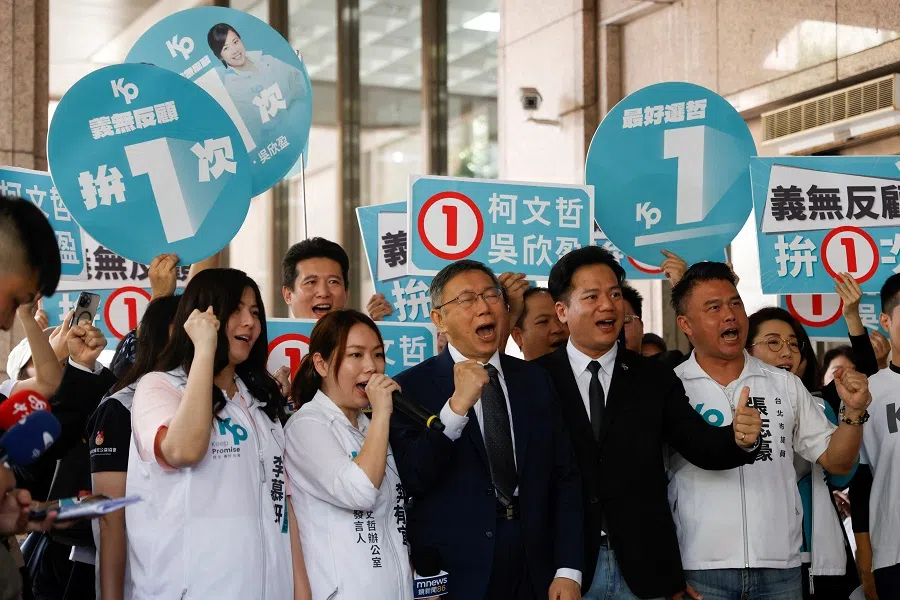
In the last two presidential elections, younger voters were staunch supporters of the DPP, but its current candidate, William Lai, is less appealing to this group than incumbent Tsai Ing-wen and Ko, allowing the latter to garner way more support from younger voters than both Lai and Hou. However, the TPP's intention to nominate mainland China-born Xu Chunying as a legislator-at-large sparked controversy over her nationality, causing the party to lose the support of a considerable number of young voters.
In addition, Ko yielding to the KMT at one point during coalition talks cost him another chunk of support from young voters who generally dislike the KMT. One key issue for both the DPP and the KMT in the coming weeks is how to carve up Ko's remaining support.
In this regard, both camps have made their moves. Hou's native Taiwanese identity stands out, with some labelling him as having "Blue skin and Green bones". To help Hou gain the support of the "deep Blue" voters, the KMT made Han Kuo-yu, the former Kaohsiung mayor who enjoys the support of the "deep Blue" faction, its top legislator-at-large nominee. Then, Hou made Chao Shao-kang, who has far-right and pro-unification inclinations, his running mate. Following this, Chao went all out after Ko and announced his intention to reduce Ko's support to below 20% so that the KMT could win the election with just 45% of the votes.
While the eloquent and combative Chao [Shao-kang] can give Hou a boost, it remains to be seen whether he will be content as Hou's right-hand man given his independent and outspoken nature.
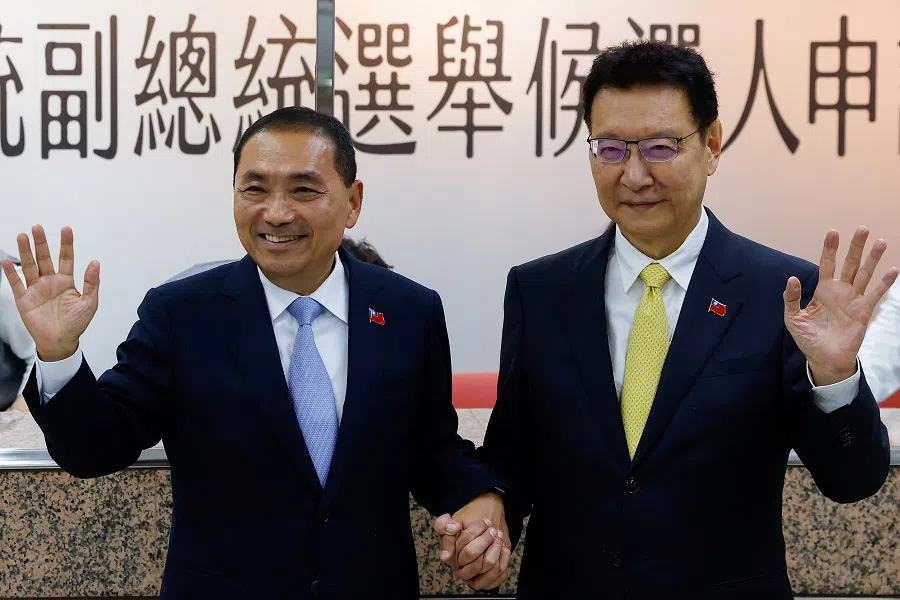
While the eloquent and combative Chao can give Hou a boost, it remains to be seen whether he will be content as Hou's right-hand man given his independent and outspoken nature. In fact, Chao has compared himself to Zhao Zilong who provided Liu Bei with invaluable help in his quest to unite China during the Three Kingdoms era. Some meddlers immediately latched on to this and alleged that Chao's comparison was making a veiled reference to Hou as Ah Dou, Liu's son and inept successor. In addition, the DPP's Lai also mocked that the choice of Chao relegated Hou to the role of a puppet.
Likeable Hsiao Bi-khim
At the moment, a big plus for Lai is his choice for running mate - Hsiao Bi-khim, who recently left her post as Taiwanese representative to the US. The 52-year-old was born in Taiwan and is of Taiwanese-American descent. Hsiao's family moved to the US when she was in secondary school and gained a master's degree in political science from Columbia University. Hsiao's salient Taiwanese identity and global outlook make her better equipped to contribute to international issues than Hou and Ko, as well as their running mates who are all lacking in this aspect.
The reality is that many Taiwanese youths are looking outwards when it comes to their futures and do not rule out mainland China as a possible destination, but China is only part of the world and one of their options.
The DPP is trying to use Hsiao's image to confer meaning to the upcoming presidential election by having voters choose between embracing the world or being trapped within China.
Hsiao's background makes her a role model for such youths. More importantly, her fondness for cats allows her to connect with numerous young and even middle-aged Taiwanese who likewise adore cats. At several press conferences, Hsiao also put her acumen as a former diplomat to good use by not stealing Lai's limelight and yet avoiding being relegated to being an ornament. The DPP is trying to use Hsiao's image to confer meaning to the upcoming presidential election by having voters choose between embracing the world or being trapped within China.
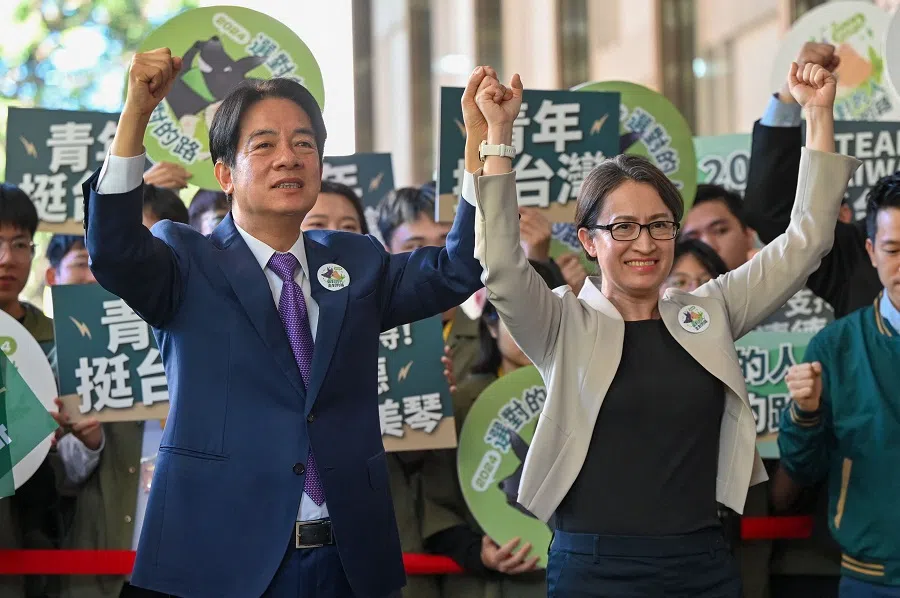
So, what is Lai's biggest weakness? Back in 2017, he called himself a "pro-independence pragmatist" in the Legislative Yuan during his tenure as premier. Lai stated, "I am a political worker who advocates Taiwan's independence. At the same time, I am a pro-independence pragmatist. By pragmatic, I mean that we are a sovereign nation called the Republic of China (ROC) and we will not seek to proclaim our independence separately". This is a major point of contention that the KMT and China will continue to attack. Even the US previously sought to clarify what Lai had meant.
Following this, Lai continued to emphasise that the ROC (Taiwan) is already a sovereign nation and reverted to Tsai Ing-wen's more robust "four commitments". Nevertheless, Lai's opponents will continue to target him over the issue of Taiwan's independence.
Deterrence and reassurance
On 30 November, an article by Bonnie Glaser and two other China experts on relations between the US, China and Taiwan published in Foreign Affairs stated that if Lai wins the election, he should consider suspending the independence clause in the DPP's party charter. Anti-DPP television personality Julian Kuo, KMT chairman Eric Chu and others then sensationalised this as proof that Washington does not trust Lai.
In fact, the focus of the article is not on the amendment of the independence clause, but to stress that Taiwan's security cannot depend solely on "deterrence" and that there is also a need to work on "reassurance". This means that while they work on bolstering Taiwan's military defences to deter China from using military force to invade Taiwan, the US and Taiwan should reiterate that Taiwan will not seek independence in order to earn Beijing's trust.
The authors felt that suspending the independence clause is a means of reassurance. It should also be noted that the article not only suggested that Lai guarantees he will not seek independence, but also called on Beijing to guarantee that it will not attack Taiwan as long as the island does not proclaim its independence. However, anti-Green media personalities and political figures chose to focus on having the DPP provide unilateral reassurance, while overlooking the need for Beijing to reciprocate. Subsequently, Glaser published a clarification on X (formerly Twitter) that the Taiwanese media and political figures have taken her proposition out of context.
Will the DPP heed this advice and move to amend or suspend the independence clause? Based on how events have unfolded over the last three decades or so, that is not likely.
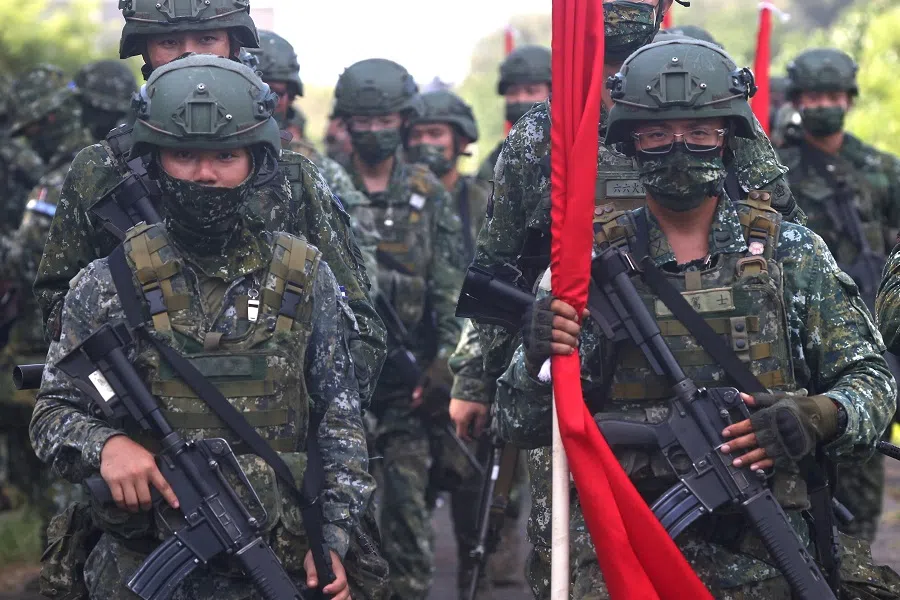
The 30 November article is not novel and the discussion therein is largely similar to that in the "Avoiding War Over Taiwan" policy brief that its three authors co-authored with 11 other China or strategy experts over a year ago. Both articles argued against the US adopting "strategic clarity" (i.e. giving clear warning to Beijing that the US would intervene in the event conflict breaks out in the Taiwan Strait) and advocated reassurance in addition to deterrence.
Will the DPP heed this advice and move to amend or suspend the independence clause? Based on how events have unfolded over the last three decades or so, that is not likely. Through means such as its 1999 Resolution on Taiwan's Future, the DPP has declared that the ROC (Taiwan) is already a sovereign nation so there is no need for it to proclaim its independence.
Some may then question whether there is still a need for the independence clause in the party charter since the DPP has said that there is no need to declare independence. The DPP's logic is that the independence clause is the ultimate weapon against military incursion by mainland China - if China promises not to use military force, the DPP will not declare independence; in the absence of such a guarantee, it is not necessary for the DPP to first promise that it will not declare independence.
Meanwhile, the KMT and TPP argue that the DPP's refusal to revoke its independence clause provides Beijing with even more excuses to use military power, underlining their emphasis that the 2024 presidential election is a choice between war and peace.
With only around 30 days left before election day, both the government and the opposition in Taiwan will continue to tussle over the two main issues of "embracing the world or being trapped within China" and "choosing war or peace".
This article was first published in Lianhe Zaobao as "台湾大选两道选择题".
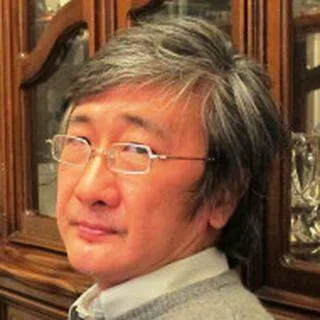


![[Big read] When the Arctic opens, what happens to Singapore?](https://cassette.sphdigital.com.sg/image/thinkchina/da65edebca34645c711c55e83e9877109b3c53847ebb1305573974651df1d13a)
![[Video] George Yeo: America’s deep pain — and why China won’t colonise](https://cassette.sphdigital.com.sg/image/thinkchina/15083e45d96c12390bdea6af2daf19fd9fcd875aa44a0f92796f34e3dad561cc)
